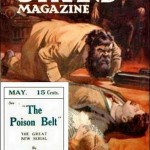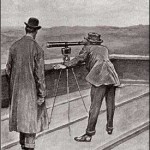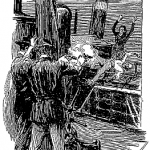“She has flared up,” said the one-eyed man, removing his pipe from his lips. “Blow me asunder if she bean’t a rustler!” He brought his camp-stool from the side of the pillar and, planting it right in the centre of the gateway, sat down upon it again. “You see, missy,” he remarked, “it’s no manner o’ use. If you did get out it would only be to be put in a reg’lar ‘sylum.”
“An asylum!” gasped Kate, sobbing with pain and anger. “Do you think I am mad, then?”
“I don’t think nowt about it,” the man remarked calmly. “I knows it.”
This was a new light to Kate. She was so bewildered that she could hardly realize the significance of the remark.
“Who are you?” she said. “Why is it that you treat me in this cruel way?”
“Ah, now we come to business,” he said, in a satisfied way, crossing his legs, and blowing great wreaths from his pipe. “This is more like reason. Who am I? says you. Well, my name’s Stevens—Bill Stevens, hesquire, o’ Claxton, in the county o’ Hants. I’ve been an A.B. in the navy, and I’ve got my pension to show it. I’ve been in the loon’cy business, too—was second warder in the suicide ward at Portsmouth for more’n two year. I’ve been out of a billet for some time, and Muster Girdlestone he came to me and he says, ‘You’re William Stevens, hesquire?’ says he. ‘I am,’ says I. ‘You’ve had experience o’ loonies?’ says he. ‘I have,’ says I. ‘Then you’re the man I want,’ says he. ‘You shall have a pound a week an’ nothing to do.’ ‘The very crib for me,’ says I. ‘You’ve got to sit at the gate,’ says he, ‘and prevent a patient from gettin’ out!’ That was all as he said. Then you comes down from Lunnon, an’ I comes up from Claxton, and here we be, all snug an’ comfort’ble. So, you see, missy, it ain’t no use at all, and you’ll never get out this way.”
“But if you let me past he will think that I ran by so quickly that you could not stop me. He could not be very angry then, and I shall give you more money than you would lose.”
“No, no,” said the man, shaking his head energetically, “I’m true to my colours, sink me, but I am! I never was bribed yet, and never will be unless you can offer cash down instead o’ promises. You can’t lay them by to live on in your old age.”
“Alas!” Kate cried, “I have no money except these few shillings.”
“Give them over here, then.” He put them in his trouser pocket beside the other one. “That’s all right, missy,” he said, in a beery whisper. “I won’t say anything now to Muster Girdlestone about this job. He’d be wild if he knew, but mum’s the word with William Stevens, hesquire. Lor’, if this ain’t my wife a-comin’ out wi’ my dinner! Away with ye, away! If she seed me a-speakin’ to you she’d tear your hair for you as like as not. She’s jealous, that’s what’s the matter wi’ her. If she sees a woman makin’ much o’ me, it’s just pisen to her, and she goes for ’em straight. She’s the one to make the fur fly! Away with you, I say!”
Poor Kate, appalled by the possibility of making a new enemy, turned and retraced her steps slowly and sadly up the avenue. As she glanced back she saw a gaunt, hard-featured woman trudging up the lane with a tin can in her hand. Lonely and forlorn, but not yet quite destitute of hope, she turned to the right among the trees, and pushed her way through bushes and brambles to the boundary of the Priory grounds. It was a lofty wall, at least nine feet in height, with a coping which bristled with jagged pieces of glass. Kate walked along the base Of it, her fair skin all torn and bleeding with scratches from the briars, until she satisfied herself that there was no break in it. There was one small wooden door on the side which was skirted by the railway line, but it was locked and impassable. The only opening through which a human being could pass was that which was guarded in the manner she had seen. The sickening conviction took possession of her mind that without wings it was an utter impossibility either to get away or to give the least information to any one in the world as to where she was or what might befall her.
When she came back to the house, tired and dishevelled after her journey of exploration, Girdlestone was standing by the door to receive her with a sardonic smile upon his thin lips. “How do you like the grounds, then?” he asked, with, the nearest approach to hilarity which she had ever heard from him. “And the ornamental fencing? and the lodge-keeper? How did you like them all?”
Kate tried for a moment to make some brave retort, but it was a useless attempt. Her lips trembled, her eyes filled, and, with a cry of grief and despair which might have moved a wild beast, she fled to her room, and, throwing herself upon her bed, burst into such scalding bitter tears as few women are ever called upon to shed.




